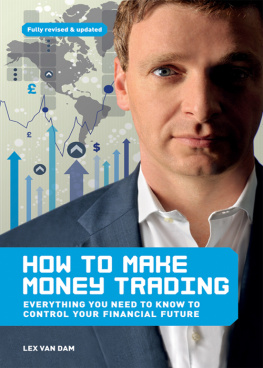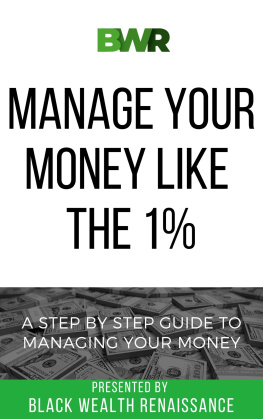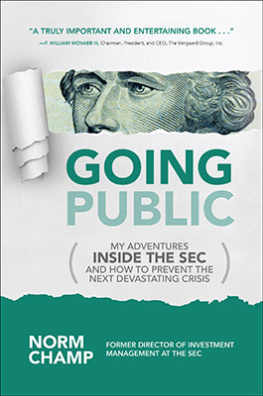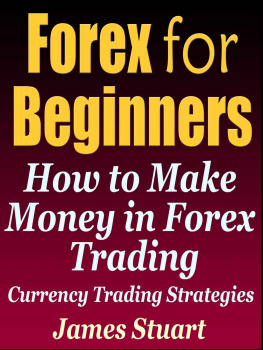MANAGE YOUR
MONEY
LIKE THE RICH
AND FAMOUS
LEVERAGING NEW INVESTMENT
TECHNOLOGY FOR
THE SMALLER INVESTOR
By N JTravers
Copyright
Published as an ebook byN.J.Travers 2020. Copyright N.J.Travers 2020.
N.J.Travers has assertedhis right under the Copyright, Designs and Patents Act 1988 to beidentified as the author of this work.
All rights reserved: Thisebook is licensed for your personal enjoyment only. This ebook maynot be re-sold or given away to other people. If you would like toshare this book with another person (other than ending it for 14days), please purchase an additional copy for each person you shareit with. If youre reading this book and did not purchase it, or itwas not purchased for your use only, then you should purchase yourown copy. Thank you for respecting the hard work of thisauthor.
Visit the N.J.Traversat
Www.NickTraversMoney.com
Disclaimer
Thispublication, is intended to be read by an international audience.Monetary amounts are denominated as Pounds Sterling, but couldequally be denominated as US Dollars, or Euros. Financialbusinesses in any of these countries, tend to round monetaryfigures to the nearest thousand anyway, so a direct comparison offigures would not make any sense.
Monetaryamounts are not meant to be accurate, but exist to illustrate thesort of financial levels being discussed. If your monetarydenomination is not roughly equivalent to Pounds Sterling, you willneed to convert the figures to your own denomination using currentexchange rates.
Thispublication deals with broad, strategic, financial concepts. Thenames of companies, businesses, financial institutions, platforms,and funds, are deliberately omitted. Markets change and evolve allthe time, with new entrants joining on a regular basis. Innovation,rationalization, retrenchment, and redirection continually alterthe desirability of any specific investment. Opportunitiesavailable in one country or territory, are not available in others.Also, financial regulations, between different countries andregimes, can differ vastly.
Using thefinancial strategies within this publication, and research ofavailable markets, should enable any investor to construct theirown financial strategy. This will be specific to their own needs,financial situation, country, regulatory regime, andmarkets.
Chapter One - The Problem
VanishingInterest Rates
The Bank of England andthe Federal Reserve, have suggested interest rates are likely toremain low for the next few decades. In this low interest rateenvironment, millions of smaller savers and investors will fallinto the trap of seeing their hard earned savings steadily erode invalue.
The good news, is thatsmaller investors can now take advantage of new investmentparadigms. With modern technology, smaller investors can enjoy thesort of monetary growth traditionally only enjoyed by the rich andwell connected.
First, though, we need tolearn to think like a bank.
A Bit ofBackground
My daughterreceived some money for her eighteenth birthday, so I looked for abook to teach her about the principles of modern saving andinvesting. What I found was an alarming lack of anything remotelyuseful, or up-to-date. There are plenty of books on how to gambleeverything on the stock market. On currency exchanges, binaryoptions, or crypto currencies. And plenty of so called 'get richquick' schemes.
However, forthe smaller investor, there was next-to-nothing to teach anyone themodern principles and skills of saving and investing. Nothing onhow to use technology to build up from zero in a steady, reliable,sensible, low risk way; nothing on how to use technology to makethe money already saved grow faster than inflation and taxes - justlike the rich. So I decided to write such a book myself.
Before Icontinue, who am I to tell you what to do with your money? Let meintroduce myself:
Fortwenty-five years, before changing career path to become aprofessional writer, I worked in the financial services sector, forinsurance and banking institutions. I qualified as a financialadvisor, though I have never been licensed to give regulatedadvice. And I worked with Lloyds of London. I have designed andmarketed savings, investments, and pension products. I havedesigned and formulated the advice financial advisors give tocustomers. And I have worked on the compliance and auditing of thatadvice. In short, I believe I have a reasonable understanding ofhow banks and financial institutions work and the processes theyuse to make money. Which is why I use so few of theirproducts.
I am not arich financier trying to persuade you to invest in fancy investmentschemes or 'Get rich quick' scams. And I am not selling anyfinancial products. In fact, throughout this book I won't mention asingle company or product by either name or brand. There is, infact, no point in me mentioning products and brands at all. Becausein your location, in your part of the world, the products andbrands you can access, and the regulatory regimes that control whatyou can do, will be different. What I am interested in, are theprinciples and strategies offered by new technology. These willwork for anyone, anywhere in the world, provided you have access toa bank account and a computer or smartphone.
I'm a writer,all I am selling is this book. I am also a smaller investor,practicing what I preach. And now sharing, with you, the financialprinciples and strategies that I have found to work for myself. Ibelieve they can work for anyone. If this book sells well, I maybecome a slightly larger investor, but I doubt if I will ever berich and famous.
I firstbecame interested in investments through my Grandfather. He was anaccountant for a national business and he also managed theinvestments for their pension fund - what today we would call aninstitutional investor.
Every time myGrandfather bought shares for the business, he also placed aprivate order for a few shares of his own. I'm not sure if thatwould be allowed under current UK legislation, but back then it wasperfectly legal. Over the course of a few decades, my Grandfatherbuilt up a respectable share portfolio, which he traded through abroker.
After hisretirement, it became my Grandfather's hobby to manage his sharesand supplement his pension from the portfolio income. In fact, thebest present I ever bought him was an annual subscription to theSaturday Financial Times. I have many happy childhood memories ofus sitting at his dining room table, pouring over the share pagesof the Financial Times, while he compiled the list of buy and sellorders which he would give to his broker on Monday morning. Then wewould play chess and other board games.
I was far tooyoung to understand what my Grandfather was doing, but he derived alot of pleasure from reading his present very closely every week. Ipaid for that Saturday subscription every year until hisdeath.
Even thoughthe technology I am talking about in this book would be alien to myGrandfather, he would definitely recognize the principles andstrategies. And he would approve.
Thinking like aBank
We all thinkwe know how banks make their money. We are wrong. We think they usethe 'deposit to lend' model, in which banks take all the smallamounts of money deposited by their customers, lump it all togetherand lend it out in larger amounts, to other customers andbusinesses. Then a proportion of the interest made from these loansis paid to the owners of the original deposits.
However, anindication this model no longer works, is seen in the evershrinking interest rates banks pay to depositors. But banks arestill making huge profits - how come, and why have banks become sogreedy?
The answer tothis apparent greed, is that banks have not worked on a 'deposit tolend' model for a very long time. In fact not since the middle ofthe last century. Today, the amount deposited by customers has verylittle bearing on a bank's loan business. Banks actually buy in themoney they require from central banks, at discounted rates, thenlend that purchased money out as loans to customers.
Next page










